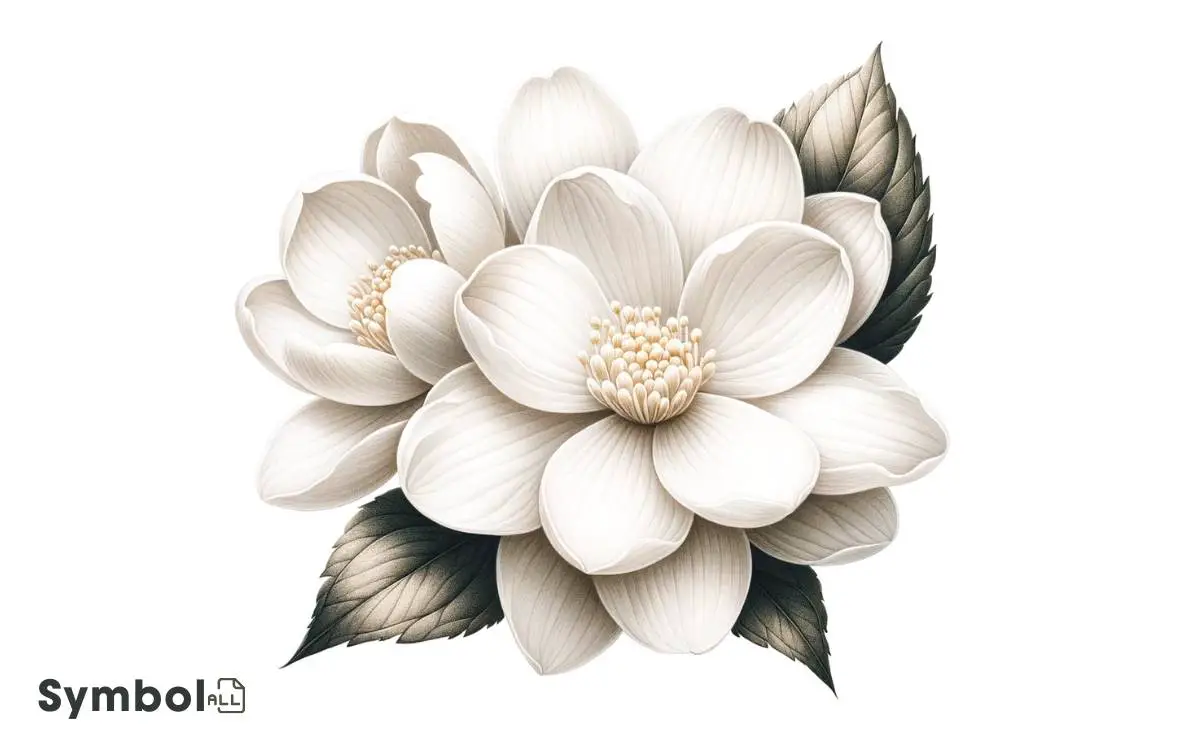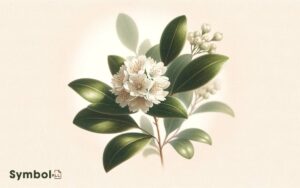What Does Jasmine Flower Symbolize? Eternal Love!
You’ve likely encountered jasmine’s enchanting fragrance, but its symbolism extends far beyond its scent. Culturally, jasmine denotes eternal love and affection, being a potent emblem in love rituals.
Scientifically, its white petals and specific phytochemicals, such as linalool, associate it with purity and innocence. Additionally, jasmine’s bilateral symmetry and vibrant leaves contribute to its representation of beauty.
In spiritual and healing contexts, jasmine signifies motherhood, fertility, and renewal, grounded in its calming phenolic compounds and historical use in ceremonies. Exploring jasmine further reveals its rich layering of meanings across different spheres.

Key Takeaways
Historical Significance
Throughout history, the jasmine flower has held profound cultural and symbolic significance across various civilizations, deeply intertwined with their rituals, traditions, and beliefs.
In scientific terms, Jasminum, commonly known as jasmine, comprises over 200 species, each embodying unique phytochemical compositions that contribute to its distinct fragrance and medicinal properties.
Research indicates that ancient societies utilized jasmine in ceremonies and spiritual practices, highlighting its role in purification and protection.
For instance, in some Asian cultures, jasmine was intricately linked to spiritual cleanliness, often used in temple offerings to signify respect and purity.
Similarly, historical texts document its use in herbal medicine, leveraging its antiseptic and anti-inflammatory properties. These multifaceted applications underscore jasmine’s integral position within historical contexts, reflecting its versatility beyond mere aesthetic appeal.
Love and Romance
In examining the jasmine flower’s role in love and romance, you’ll find it’s often symbolized as a token of eternal love across various cultures, underpinned by extensive floral symbolism studies.
Research indicates that incorporating jasmine in romantic gestures greatly enhances the perception and expression of love, attributing to its distinct fragrance and aesthetics.
Moreover, the flower’s presence in intimate settings is documented to bolster feelings of affection and closeness, a phenomenon supported by psychological studies on sensory stimulation and emotional response.
Eternal Love Symbol
The jasmine flower symbolizes eternal love, serving as a poignant reminder of the enduring nature of deep affection and romantic bonds.
Its botanical characteristics and scent profile have been analyzed in various studies, indicating a correlation between jasmine’s properties and its symbolism in love.
For instance, the perennial nature of jasmine plants suggests a lasting bond, while its intoxicating fragrance is often associated with attraction and seduction in romantic contexts.
| Feature | Symbolism |
|---|---|
| Perennial Growth | Endurance of Love |
| Intoxicating Scent | Attraction and Seduction |
| White Blossoms | Purity and Innocence in Love |
| Night Blooming | Mystery and Depth of Emotions |
Understanding these aspects helps to appreciate why jasmine is a potent symbol of eternal love, deeply embedded in cultural narratives around romance.
Romantic Gestures Significance
Reflecting on the symbolism of the jasmine flower as an emblem of eternal love, it’s imperative to explore how romantic gestures, rooted in love and romance, amplify the depth and endurance of such bonds.
Scientific studies suggest that these gestures, including the giving of jasmine flowers, trigger a complex cascade of neurochemical reactions in the brain.
Dopamine, often termed the ‘feel-good hormone,’ surges, reinforcing the emotional and psychological connection between partners. Additionally, oxytocin, known as the ‘love hormone,’ is released, enhancing feelings of trust and attachment.
This biochemical response not only deepens the emotional bond but also fortifies the relationship’s resilience against challenges.
The act of giving jasmine, with its rich fragrance and delicate petals, transcends mere tradition, embedding itself in the very neurology of human connection and love.
Intimacy and Affection Display
Displaying intimacy and affection, essential elements in love and romance, often involves a series of intricate, science-backed behaviors that greatly influence relationship dynamics and emotional bonding.
When you express love through physical closeness or emotional gestures, your body releases oxytocin, sometimes referred to as the ‘love hormone.’ This neurochemical plays a pivotal role in enhancing the bond between partners, fostering a sense of security and attachment.
Research suggests that consistent, genuine displays of affection, such as holding hands, hugging, or gifting symbolic items like jasmine flowers, can markedly elevate relational satisfaction.
These actions signal a deep acknowledgment of the other’s value and a commitment to nurturing the connection, laying a foundation for a resilient, emotionally rich relationship.
Purity and Innocence
Jasmine flowers symbolize purity and innocence, largely due to their pristine white petals and delicate fragrance, characteristics that researchers associate with these universally valued qualities.
The association isn’t merely aesthetic; it’s deeply rooted in the flower’s biological and cultural significance.
- Anthocyanin Absence: The lack of anthocyanin pigments results in the jasmine’s white coloration, symbolically linked to purity.
- Fragrance Compounds: Linalool and benzyl acetate, key components of jasmine’s scent, evoke a sense of cleanliness.
- Cultural Practices: In many traditions, jasmine is used in ceremonies celebrating birth and renewal, underscoring its innocence symbolism.
- Psychological Impact: Studies suggest that the scent of jasmine can induce feelings of calmness, reinforcing its association with purity.
Understanding these elements offers a deeper appreciation of jasmine’s symbolization of purity and innocence.
Beauty and Attractiveness
Beyond its symbolism of purity and innocence, many find the jasmine flower enchanting for its aesthetic appeal and the intricate science that explains its beauty. The jasmine’s allure isn’t merely superficial; it’s deeply rooted in its biological makeup and evolutionary advantages.
Researchers have found that the jasmine flower’s radiant white petals serve a dual purpose: they act as a visual attractant to pollinators under moonlight and effectively reflect ultraviolet light, which many insects can see.
This unique characteristic enhances the flower’s visibility in its natural habitat, ensuring successful pollination.
Additionally, the symmetrical form of jasmine blooms adheres to the principle of bilateral symmetry, which is often associated with attractiveness in nature.
This symmetry, combined with the contrast of its vibrant green leaves against the stark whiteness of its petals, makes the jasmine flower a mesmerizing sight, embodying the essence of beauty and attractiveness in the floral world.
Motherhood and Fertility
You’ll find that the jasmine flower holds profound symbolic meanings in various cultures, often linked to motherhood and fertility.
Studies highlight its presence in religious ceremonies, where it represents purity and divine hope, playing an essential role in rituals around birth and renewal.
Additionally, fertility celebrations worldwide incorporate jasmine, acknowledging its association with procreation and the cycle of life.
Symbolic Meanings in Cultures
In various cultures, the jasmine flower symbolizes motherhood and fertility, reflecting its deep-rooted significance in societal rituals and traditions. This symbolism isn’t arbitrary but is deeply entwined with the plant’s biological characteristics and historical usage.
To grasp the depth of jasmine’s significance in these contexts, consider:
- Prolific blooming: Jasmine’s abundant flowers symbolize fertility.
- Fragrance: The intoxicating scent represents the allure and nurturing nature of motherhood.
- Evergreen nature: Symbolizes eternal, unconditional love akin to a mother’s.
- Use in rituals: Often used in ceremonies celebrating birth and marriage, highlighting its association with life’s cycles.
Understanding jasmine’s symbolism requires appreciating its multifaceted role in reflecting and enhancing human experiences related to birth, life, and the nurturing aspects of motherhood.
Jasmine in Religious Ceremonies
Reflecting its deep-seated symbolic significance, jasmine flowers play a pivotal role in various religious ceremonies related to motherhood and fertility.
These blossoms, renowned for their pristine beauty and intoxicating fragrance, have been intricately woven into the fabric of several cultures’ spiritual practices.
Scientific studies have observed that the jasmine flower, with its robust reproductive mechanisms, including entomophilous pollination, symbolizes the nurturing aspect of motherhood and the cyclical nature of fertility.
In religious contexts, jasmine is often presented as an offering to deities symbolizing fertility, purity, and motherhood, underpinning the belief in its divine blessing for procreation.
Ethnobotanical research underscores jasmine’s utilization in rituals, manifesting the collective reverence towards its symbolic association with life’s genesis and the sustenance of lineage.
Fertility Celebrations Worldwide
Building on the symbolic significance of jasmine in religious ceremonies, cultures around the world celebrate fertility through a variety of unique and deeply meaningful festivals.
These events not only mark the importance of motherhood and fertility but also integrate scientific understanding of human reproduction with cultural practices.
Here’s how:
- Holi in India, where fertility is celebrated with vibrant colors, symbolizing the vivacity and richness of life.
- Cherry Blossom Festival in Japan, representing the fleeting nature of life and the fertility of the earth as it awakens in spring.
- Beltane in Celtic traditions, focusing on the purification and fertility of the environment through fire rituals.
- Feast of Lupercalia in ancient Rome, aimed at ensuring fertility and purifying the city through rites directly connected to agricultural and human fertility cycles.
These festivals embody a deep-rooted appreciation for the cycle of life, weaving together scientific insights into fertility with age-old traditions.
Wealth and Good Luck
Jasmine flowers symbolize wealth and good luck, a connection deeply rooted in various cultural practices and scientific studies on plant symbolism.
Ethnobotanical research demonstrates that jasmine’s association with prosperity isn’t merely folklore but is embedded in the socio-economic fabric of several societies.
The fragrance of jasmine, scientifically identified as containing linalool and benzyl acetate, has been linked to enhancing mood and cognitive performance in aromatherapy studies, potentially influencing perceptions of success and well-being.
Moreover, the visual appeal of jasmine, with its pristine white petals, often denotes purity and simplicity, qualities frequently associated with a prosperous life.
In economic terms, jasmine holds significant value in the global floral trade, underpinning its symbolic representation of wealth.
Spiritual Connections
Beyond its economic and aesthetic value, the jasmine flower holds profound spiritual significance across various cultures, often symbolizing purity, love, and divine hope.
This connection isn’t superficial; it’s deeply rooted in the flower’s unique characteristics and the way it impacts human senses and emotions.
Consider these aspects:
- Phenolic Compounds: Jasmine’s fragrance is rich in these, known to have calming effects on the nervous system.
- Night-Blooming Nature: Symbolizes self-reflection and enlightenment, as it encourages introspection during quieter hours.
- White Petals: Represent purity and are often associated with spiritual ceremonies across cultures.
- Ubiquity in Sacred Texts: Frequently mentioned in religious scriptures, indicating its deep-rooted spiritual importance.
Understanding jasmine’s spiritual connections can enhance your appreciation for this remarkable flower, recognizing it as more than just a visual or olfactory delight.
Death and Mourning
As you explore the jasmine flower’s role in death and mourning, consider its integration into cultural mourning practices, where its presence often serves as a symbol of respect and remembrance.
Studies have shown that the jasmine flower’s symbolic use at funerals can greatly impact the grieving process, offering solace and a sense of connection to the departed.
This utilization underscores the flower’s profound significance across various cultures, highlighting its ability to convey empathy and support during times of loss.
Cultural Mourning Practices
Understanding cultural mourning practices reveals the profound ways in which societies honor the dead, embodying a rich diversity of rituals and symbols across the globe.
These practices range from the deeply spiritual to the strictly ceremonial, reflecting the community’s values, beliefs, and historical traditions.
- Observation of mourning periods: Societies may designate specific time frames for mourning, utilizing both social and religious calendars to guide the bereavement process.
- Ritual purification: In many cultures, cleansing rituals serve to purify the living and the deceased, facilitating a peaceful shift to the afterlife.
- Symbolic attire: Mourning attire, often in specific colors, communicates the mourner’s status and respects the deceased’s memory.
- Communal gatherings: Memorial services and funerals provide a communal space for expressing grief, offering support, and celebrating the life of the deceased.
These elements underscore the complexity and universality of mourning, highlighting the human need to commemorate and reflect upon loss.
Symbolic Funeral Use
Exploring the symbolic funeral uses within different cultures reveals how societies employ specific rituals and symbols to navigate the complexities of death and mourning.
Jasmine, scientifically known as Jasminum, serves as a poignant emblem in funeral rites across various regions. Its pervasive fragrance and delicate white blossoms symbolize purity and the soul’s journey to peace, offering solace to the bereaved.
Ethnobotanical studies highlight jasmine’s role in ceremonial practices, where it’s woven into wreaths or placed upon graves, signifying respect and remembrance.
This ritualistic use is entrenched in the belief that jasmine’s scent connects the material to the spiritual domain, facilitating a serene passage for the departed.
Such practices underscore jasmine’s profound significance in commemorating life, fostering a collective mourning process, and acknowledging the cycle of life and death.
Healing and Medicinal Uses
Jasmine flowers offer a wealth of medicinal properties, serving as natural remedies for various health conditions.
Here’s how you can leverage their benefits:
- Antioxidant Properties: Jasmine contains antioxidants, which combat oxidative stress and may reduce the risk of chronic diseases.
- Antimicrobial Activity: Studies have shown jasmine’s effectiveness against a variety of pathogens, suggesting its potential in treating infections.
- Anxiolytic Effects: The scent of jasmine has been found to have a calming effect, potentially aiding in the treatment of anxiety and promoting relaxation.
- Anti-inflammatory Capabilities: Jasmine’s anti-inflammatory properties make it beneficial for reducing inflammation and associated pain in conditions like arthritis.
Incorporating jasmine into your wellness routine could offer you a natural, therapeutic approach to managing health concerns, backed by research.
Celebration and Joy
Beyond its medicinal properties, numerous cultures celebrate the jasmine flower as a symbol of happiness and love, deeply ingrained in various traditional ceremonies and festivities.
Ethnobotanical studies reveal that the jasmine flower, with its distinct, sweet fragrance, plays a pivotal role in rites of passage, including weddings and birth celebrations across many societies.
Its olfactory properties are linked to the enhancement of mood and emotional well-being, making it a preferred choice for such occasions.
Scientific research into the jasmine flower’s aroma compounds, such as linalool and benzyl acetate, has shown these chemicals can induce positive psychological effects, including a sense of calmness and joy.
Consequently, the jasmine flower’s association with celebration and joy isn’t only culturally significant but also supported by empirical evidence.
Creativity and Inspiration
Delving into the domain of creativity and inspiration, studies have shown that the scent of jasmine can greatly enhance cognitive function and creative thinking.
When you’re seeking to ignite your creative spark, consider the unique properties of jasmine:
- Neurological Stimulation: Jasmine’s aroma triggers positive changes in brain chemistry, fostering a conducive environment for innovation.
- Stress Reduction: By lowering stress levels, jasmine creates a serene mindset, pivotal for creative endeavors.
- Enhanced Focus: Research indicates that jasmine can improve concentration, allowing for prolonged periods of focused creative work.
- Mood Elevation: The uplifting scent of jasmine is linked with elevated moods, a critical factor in maintaining the flow of inspiration.
Understanding these aspects can help you leverage jasmine in your pursuit of creativity and inspiration, making it a valuable ally in artistic and intellectual projects.
Global Symbols and Interpretations
Across cultures, the jasmine flower holds various symbolic meanings, each deeply rooted in historical traditions and beliefs. In Asia, it’s often associated with purity and motherhood, reflecting the white color’s symbolic purity and the plant’s nurturing growth.
Scientific studies on cultural symbolism have identified jasmine as a significant emblem of love and respect in countries like Thailand and Indonesia, where it plays an essential role in wedding ceremonies and religious rituals.
In the Middle East, jasmine symbolizes beauty and sensuality, frequently appearing in poetry and literature to depict love and desire.
This multifaceted symbolism demonstrates jasmine’s universal appeal, transcending geographical boundaries to represent concepts of purity, love, beauty, and respect across diverse cultures.
Conclusion
The jasmine flower isn’t just a feast for your senses; it’s a tapestry woven with threads of historical, emotional, and medicinal significance.
From symbolizing love and purity to embodying healing virtues, jasmine serves as a beacon of multifaceted meanings across cultures.
As you explore its essence, remember, every petal holds a story, a proof to nature’s intricate design and its profound impact on human emotions and health.
Let jasmine’s fragrance guide you through its rich symbolic landscape, unfolding mysteries with every breath.






